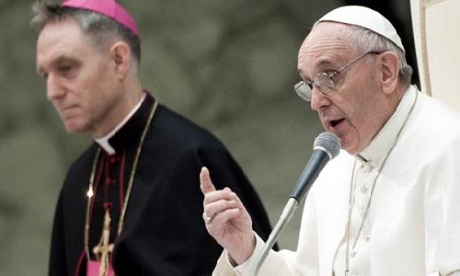Pope Francis has described priests who refuse to baptise the children of young single mothers as “animals”.
Francis was speaking at a Q&A session near the end of a pastoral conference of Rome diocese on the family.
Crux reported that Francis spoke of a “pastoral cruelty” at the Q&A.
An example is priests who refuse to baptise the children of young single mothers.
“They’re animals,” Francis said at the Basilica of St John Lateran.
“This is individualism.”
[It’s] “an individualism which doesn’t affect only priests, but society as a whole, that looks for pleasure, that is hedonist, searching for that ‘damned’ well-being which has hurt us so much,” the Pope said.
He was also asked about the balance between Church teaching on two subjects.
These are the indissolubility of marriage and being welcoming to divorced and civilly remarried couples.
Francis said that neither “rigorism nor laicism” are the correct path.
“The Gospel chooses another way: welcoming, accompanying, integrating, discerning, without putting our noses in the ‘moral life’ of other people,” he said.
During impromptu remarks, Francis said that “a large majority” of sacramental marriages today are invalid.
This is because couples do not enter into them with a proper understanding of permanence and commitment, he said.
“We live in a culture of the provisional,” the Pope said, noting that this affects priestly and religious life too.
The Vatican’s official transcript of the Pope’s remarks stated “a portion” of sacramental marriages are null.
The change from the actual words was reportedly at the Pope’s behest.
The Pope’s remarks drew strong criticism.
Before the Q&A session, the Pope offered a “readers guide” of sorts to two recent synods on the family and to his apostolic exhortation Amoris Laetitia.
Francis warned against a “separatist logic” in Catholic attitudes about diverse family situations.
If a separatist logic is followed: “We believe that we gain in identity and safety whenever we differentiate and isolate ourselves from others, especially those who are living in a different situation.”
Sources
